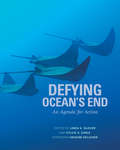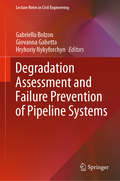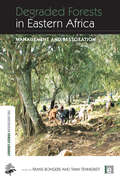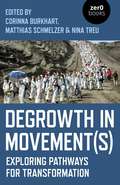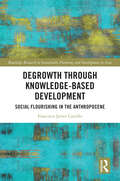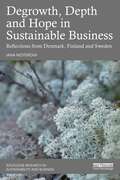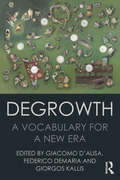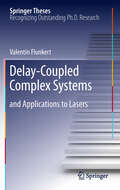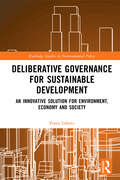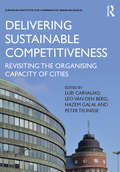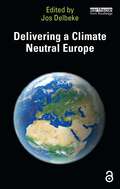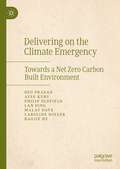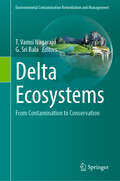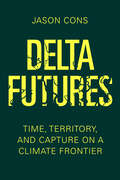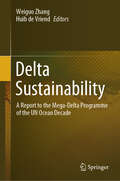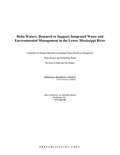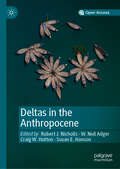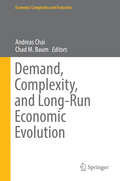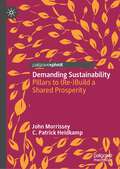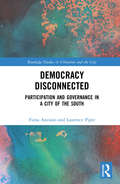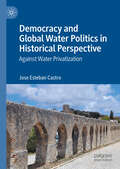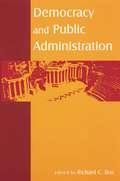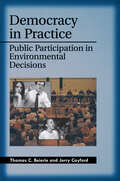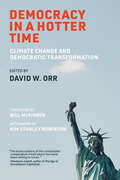- Table View
- List View
Defying Ocean's End: An Agenda For Action
by Sylvia Earle Linda Glover Graeme KelleherIf humankind were given a mandate to do everything in our power to undermine the earth's functioning, we could hardly do a better job than we have in the past thirty years on the world's oceans, both by what we are putting into it-millions of tons of trash and toxic materials-and by what we are taking out of it-millions of tons of wildlife. Yet only recently have we begun to understand the scale of those impacts. Defying Ocean's End is the result of an unprecedented effort among the world's largest environmental organizations, scientists, the business community, media, and international governments to address these marine issues. In June 2003, in the culmination of a year-long effort, they met specifically to develop a comprehensive and achievable agenda to reverse the decline in health of the world's oceans. As conservation organizations begin to expand their focus from land issues to include a major focus on preservation of the sea, it is increasingly apparent that we have to approach marine conservation differently and at much larger scale than we have to date. What's also clear is the magnitude and immediacy of the growing ocean concerns are such that no one organization can handle the job alone. Defying Ocean's End is a bold step in bringing the resources needed to bear on this vast problem before it is too late. It offers a broad strategy, a practical plan with priorities and costs, aimed at mobilizing the forces needed to bring about a "sea change" of favorable attitudes, actions, and outcomes for the oceans-and for all of us.
Degradation Assessment and Failure Prevention of Pipeline Systems (Lecture Notes in Civil Engineering #102)
by Giovanna Gabetta Gabriella Bolzon Hryhoriy NykyforchynThis book presents the results of the research project G5055 'Development of novel methods for the prevention of pipeline failures with security implications,' carried out in the framework of the NATO Science for Peace and Security program, and explores the lifecycle assessment of gas infrastructures. Throughout their service lives, pipelines transporting hydrocarbons are exposed to demanding working conditions and aggressive media. In long-term service, material aging increases the risk of damage and failure, which can be accompanied by significant economic losses and severe environmental consequences. This book presents a selection of complementary contributions written by experts operating in the wider fields of pipeline integrity; taken together, they offer a comprehensive portrait of the latest developments in this technological area.
Degraded Forests in Eastern Africa: Management and Restoration (The Earthscan Forest Library)
by Frans Bongers Timm TennigkeitForest degradation as a result of logging, shifting cultivation, agriculture and urban development is a major issue throughout the tropics. It leads to loss in soil fertility, water resources and biodiversity, as well as contributes to climate change. Efforts are therefore required to try to minimize further degradation and restore tropical forests in a sustainable way. This is the first research-based book to examine this problem in East Africa. The specific focus is on the forests of Ethiopia, Tanzania and Uganda, but the lessons learned are shown to be applicable to neighbouring countries and others in the tropics. A wide range of forest types are covered, from dry Miombo forest and afromontane forests, to forest-savannah mosaics and wet forest types. Current management practices are assessed and examples of good practice presented. The role of local people is also emphasized. The authors describe improved management and restoration through silviculture, plantation forestry and agroforestry, leading to improvements in timber production, biodiversity conservation and the livelihoods of local people.
Degrowth in Movement(s): Exploring Pathways for Transformation
by Matthias Schmelzer Nina Treu Corinna BurkhartDegrowth is an emerging social movement that overlaps with proposals for systemic change such as anti-globalization and climate justice, commons and transition towns, basic income and Buen Vivir. Degrowth in Movement(s) reflects on the current situation of social movements aiming at overcoming capitalism, industrialism and domination. The essays ask: What is the key idea of the respective movement? Who is active? What is the relation with the degrowth movement? What can the degrowth movement learn from these other movements and the other way around? Which common proposals, but also which contradictions, oppositions and tensions exist? And what alliances could be possible for broader systemic transformations? Corinna Bukhart, Matthias Schmelzer, and Nina Treu have curated an impressive demonstration that there are, beyond regressive neoliberalism and techno-fixes, emancipatory alternatives contributing to a good life for all. Degrowth in Movement(s) explores this mosaic for social-ecological transformation - an alliance strengthened by diversity.
Degrowth through Knowledge-Based Development: Social Flourishing in the Anthropocene (Routledge Research in Sustainable Planning and Development in Asia)
by Francisco Javier CarrilloThis book tackles the terms under which a knowledge-based society can indefinitely improve while pursuing an eco-economic steady state. In doing so, it addresses the literature gap on continued social improvement within a post-growth economic and cultural paradigm.Carrillo consolidates research on the Degrowth paradigm and proposes a conceptual framework for continued social improvement based on the integration of tangible and intangible collective values. He proposes a method that accounts for effective social value through capital systems valuation and development and includes this operational metric system as an alternative to the metric of Gross National Product (GNP). The book critically examines the challenges of identifying a complete and consistent representation of total social value. The book also includes a series of knowledge-based development programmes in cities and regions around the world and discusses policies and practices for urban mitigation and adaptation to the Anthropocene.This transdisciplinary book will be of particular interest to researchers of degrowth economics, sustainable development, and urban planning.
Degrowth, Depth and Hope in Sustainable Business: Reflections from Denmark, Finland and Sweden (Routledge Research in Sustainability and Business)
by Iana NesterovaThis book takes degrowth theorising in the direction of honouring collaboration, creating new dialogues and emphasising growth and human capacities. Traditionally, degrowth theorising has focussed on reduction and non‑growth. While the ecological concerns of degrowth scholarship are felt acutely by many, the suggestion of “less” can be experienced as undesirable, going against who we are as humans, and even be false in some industries and spaces. Indeed, for a degrowth society to come into being, unprecedented (though not materialistic) growth is needed. This book unpicks the business and sustainability framework rooted in degrowth scholarship and proposes a gentler approach to business for a sustainable society living harmoniously with nature. Drawing on case studies from Finland, Sweden and Denmark, Iana Nesterova reflects on how degrowth manifests in imperfect and nuanced ways and examines the ways in which businesses navigate creatively and cautiously challenging socio‑economic landscapes, and why they do this. She puts forward a new framework for growth within degrowth, centred around humanism and hope, which celebrates empathy, care, solidarity and connectedness with human and non‑human others and nature. Presenting an empowering and liberating view on sustainable business, this book will be of great interest to students and scholars of business ethics, ecological economics, business organisation and management.
Degrowth: A Vocabulary for a New Era (The\economy: Key Ideas Ser.)
by Giacomo D'Alisa Federico Demaria Giorgos KallisDegrowth is a rejection of the illusion of growth and a call to repoliticize the public debate colonized by the idiom of economism. It is a project advocating the democratically-led shrinking of production and consumption with the aim of achieving social justice and ecological sustainability. This overview of degrowth offers a comprehensive coverage of the main topics and major challenges of degrowth in a succinct, simple and accessible manner. In addition, it offers a set of keywords useful forintervening in current political debates and for bringing about concrete degrowth-inspired proposals at different levels - local, national and global. The result is the most comprehensive coverage of the topic of degrowth in English and serves as the definitive international reference. More information at: vocabulary.degrowth.org View the author spotlight featuring events and press related to degrowth at http://t.co/k9qbQpyuYp.
Delaware Water Gap National Recreation Area (Images of America)
by Laura ObisoEuropeans first settled in what was to become the Delaware Water Gap National Recreation Area (DWGNRA) in the 17th century. By the late 1800s, the Delaware Water Gap had become a popular vacation spot, attracting thousands to the palatial resorts in the mountains. Rural communities thrived in the valley until the 1960s. The DWGNRA was created in 1965 to oversee activities centered around a reservoir that was to be the result of a dam to be built on the Delaware River at Tocks Island. In anticipation of the dam, the government removed residents by purchasing or condemning property. An environmental and political war raged, and the dam was ultimately defeated. Although several historical sites were lost, many survived and a few have been restored. Today the DWGNRA is one of the country's most popular parks. Within its boundaries are rugged and beautiful wilderness, historic landmarks, and the wild and scenic Delaware River.
Delay-Coupled Complex Systems
by Valentin FlunkertThis work addresses time-delay in complex nonlinear systems and, in particular, its applications in complex networks; its role in control theory and nonlinear optics are also investigated. Delays arise naturally in networks of coupled systems due to finite signal propagation speeds and are thus a key issue in many areas of physics, biology, medicine, and technology. Synchronization phenomena in these networks play an important role, e.g., in the context of learning, cognitive and pathological states in the brain, for secure communication with chaotic lasers or for gene regulation. The thesis includes both novel results on the control of complex dynamics by time-delayed feedback and fundamental new insights into the interplay of delay and synchronization. One of the most interesting results here is a solution to the problem of complete synchronization in general networks with large coupling delay, i.e., large distances between the nodes, by giving a universal classification of networks that has a wide range of interdisciplinary applications.
Deliberative Governance for Sustainable Development: An Innovative Solution for Environment, Economy and Society (Routledge Studies in Environmental Policy)
by Franz LehnerDeliberative Governance for Sustainable Development argues that governance has become the core problem of sustainable development and identifies deliberative democracy and governance as a path forward for Western societies. In this book the author puts forward three messages. Firstly, while sustainable development theoretically is a common good of all people, it is in practice constantly associated with a multitude of smaller and larger conflicts. These conflicts arise repeatedly because, in practice, the benefits, costs and risks of sustainable development are unequally distributed and therefore form a massive barrier to sustainable development. As a result, sustainable development depends on the ability of the social and political institutions of societies to accommodate these conflicts. Second, within the framework of their established institutional structures, Western societies do not have the sufficient tools for conflict resolution that are adequate to the conditions of modern diversified societies and the complex challenges of sustainable development. They need to implement institutional reforms that switch institutional structures towards deliberation. Third, by switching to deliberation, Western societies can reach the high level of governance that enables them to achieve environmentally sustainable development that will bring them significant economic and social benefits and, as a result, may reach far beyond their borders. This volume offers a novel, transdisciplinary approach to sustainable development and governance in Western societies. It will be of great interest to students and scholars of sociology, economics, politics, environmental studies and philosophy, as well as professionals and policymakers working in the area of sustainable development.
Delivering Sustainable Competitiveness: Revisiting the organising capacity of cities (EURICUR Series (European Institute for Comparative Urban Research))
by Luís Carvalho Leo van den Berg Hazem Galal Peter TeunisseGlobal trends such as climate change, digitalisation, enhanced concepts of democracy and the consequences of the 2008 financial crisis are changing the playing field of cities across the world. Urban development objectives are shifting away from being purely concerned with wealth creation and competitiveness, to increasingly combining social and environmental dimensions. In this context, how can cities influence and sustain their competitive position over time? Which new types of urban strategies are emerging, and which organising capacities are proving the most important? This book provides insight into the complex issue of delivering sustainable competitiveness by analysing a number of innovative urban development strategies in context. Questions and topics addressed include: how can new legacies of city events be secured; how can clean technology industries be nurtured through urban regeneration initiatives; and how can the impact of urban safety strategies be enhanced? These and other pivotal questions are explored through close attention to the enabling factors linking ideas with results, such as distributed leadership, collaboration, communication and experimentation. Combining case studies from Europe, Africa, South America and Southeast Asia, the book provides a truly international perspective on the potentials and limitations of a new generation of urban development and competitiveness strategies.
Delivering a Climate Neutral Europe
by Jos DelbekeDelivering a Climate Neutral Europe summarises the achievements of 25 years of EU Climate Policy, with the emphasis on what has been achieved under the Green Deal. It also highlights climate issues on the table of policy makers in the next European policy cycle 2024–2029.Curated by Jos Delbeke, one of the foremost experts in this field, the chapters are all written by responsible officials of the EU Commission services, who were deeply involved in the negotiations related to the legislation they prepared. They explain how ambitious targets were prepared for 2030 and 2050 in view of implementing the commitments taken in 2015 under the Paris Agreement and present the overall architecture of the policy to counter the idea that an avalanche of legislative action is being developed without much structure. In particular, this book examines the carbon pricing tool that Europe implemented under the EU Emissions Trading System (EU ETS), the differentiated targets Member States have to deliver and climate-relevant EU legislation in the fields of energy, transport, industry, finance and agriculture and forestry. The authors also discuss the upcoming headwinds in the form of a growing scepticism in public opinion, and the impact of the wars in the close neighbourhood of the European continent.Written as a follow-up to previous publications EU Climate Policy Explained and Towards a Climate-Neutral Europe, this new volume will be a vital resource for students, scholars and policy makers alike who are researching and working in the areas of climate change, environmental governance and EU policy more broadly.
Delivering on the Climate Emergency: Towards a Net Zero Carbon Built Environment
by Philip Oldfield Deo Prasad Aysu Kuru Lan Ding Malay Dave Caroline Noller Baojie HeThis book focuses on the transition towards net-zero carbon built environments to deliver on the climate emergency. It provides an evidence-based roadmap and proposes guidelines to achieving targets covering emerging technologies, materials, innovative design, regulations and policies.
Delta Ecosystems: From Contamination to Conservation (Environmental Contamination Remediation and Management)
by T. Vamsi Nagaraju G. Sri BalaThis comprehensive volume delves into the intricacies of delta ecosystems, focusing on the transition from contamination to conservation. It addresses the critical challenges faced by these unique environments and introduces innovative solutions essential for sustainable restoration practices. Central to the discussion is the strategic improvement of restoration infrastructure and methods, aimed at reducing environmental impact while enhancing ecological health. The book emphasizes an interdisciplinary approach, demonstrating how collaboration among civil engineers, environmental scientists, and conservation experts can lead to the development of more effective restoration projects. Globally, over 600 million people reside in delta regions. Human activities in these areas, including their supplying canals, rivers, and estuaries, exert significant pressure on the natural resources and habitat equilibrium of deltas, leading to resource degradation and threatening the livelihoods and lives of inhabitants. This book advocates for a sustainable future for delta's worldwide and the communities that depend on them. A significant part of the book is dedicated to exploring sustainable solutions and best practices in water management, such as optimizing water use efficiency, ensuring water quality, and implementing innovative techniques to reduce water consumption and prevent pollution. It also examines the potential for integrating new materials and technologies into restoration efforts, including bio filtration systems and renewable energy sources. By applying circular economy principles to waste management in restoration projects, the book underscores a commitment to comprehensive sustainability. The findings support the Sustainable Development Goals (SDGs) and Agenda 2030, providing guidance to countries with delta regions to preserve their natural resources for future generations.
Delta Futures: Time, Territory, and Capture on a Climate Frontier
by Jason ConsA free ebook version of this title is available through Luminos, University of California Press's Open Access publishing program. Visit www.luminosoa.org to learn more.Delta Futures explores the competing visions of the future that are crowding into the Bengal Delta's imperiled present and vying for control of its ecologically vulnerable terrain. In Bangladesh's southwest, development programs that imagine the delta as a security threat unfold on the same ground as initiatives that frame the delta as a conservation zone and as projects that see the delta's rivers and ports as engines for industrial growth. Jason Cons explores how these competing futures are being brought to life: how they are experienced, understood, and contested by those who live and work in the delta, and the often surprising entanglements they engender—between dredgers and embankments, tigers and tiger prawns, fishermen and forest bandits, and more. These future visions produce the delta as a "climate frontier," a zone where opportunity, expropriation, and risk in the present are increasingly framed in relation to disparate visions of the delta's climate-affected future.
Delta Sustainability: A Report to the Mega-Delta Programme of the UN Ocean Decade
by Huib De Vriend Weiguo ZhangThis book examines sustainability issues of 15 deltas in the world. Each delta is described in five sections: physical setting, socioeconomic characteristics, current issues, management measures and perspective for future pathways to greater sustainability. These deltas, diverse in their geographical and economic conditions, are all confronted with natural hazards and pollution issues, posing threats to ecological health, human security and economic development. The book offers an overview of delta challenges in an integrated natural and social science approach. It is intended for researchers, graduate students and the public, especially those dwelling in deltas. It aims to improve knowledge of the current situation and to enhance awareness of the urgency of collective action to prepare for the uncertain future of these deltas. Possible future pathways towards delta sustainability are also addressed in the book.
Delta Waters
by National Research Council Water Science and Technology Board Division on Earth and Life Studies Committee on Strategic Research for Integrated Water Resources ManagementThe Water Institute of the Gulf is a not-for-profit, independent research institute dedicated to advancing the understanding of coastal, deltaic, river and water resource systems, both within the Gulf Coast and around the world. Their mission supports the practical application of innovative science and engineering, providing solutions that benefit society. Those who make policy for coastal and deltaic systems, as well as managers of natural resources, need high-quality science and engineering to guide their decisions. The Water Institute of the Gulf began operations in 2012 to address exactly this sort of challenge. Delta Waters offers advice to The Water Institute of the Gulf that it might use as part of its strategic planning process. This report focuses on strategic research to support integrated water resources management in the lower Mississippi River delta and includes international comparative assessments. The recommendations of Delta Waters promote a human and environmental systems approach to scientific research that supports integrated water and environmental resources management in the lower Mississippi River and delta, and offers ideas regarding comparative assessments with other, relevant deltaic regions around the world. This report provides input for research into common deltaic problems and challenges, identifies strategic research for The Water Institute of the Gulf, and suggests ways that the organization can utilize knowledge gained from the lower Mississippi River and delta system in developing a research program to support water management decisions in other large river/delta complexes.
Deltas in the Anthropocene
by W. Neil Adger Robert J. Nicholls Craig W. Hutton Susan E. HansonThe Anthropocene is the human-dominated modern era that has accelerated social, environmental and climate change across the world in the last few decades. This open access book examines the challenges the Anthropocene presents to the sustainable management of deltas, both the many threats as well as the opportunities. In the world’s deltas the Anthropocene is manifest in major land use change, the damming of rivers, the engineering of coasts and the growth of some of the world’s largest megacities; deltas are home to one in twelve of all people in the world. The book explores bio-physical and social dynamics and makes clear adaptation choices and trade-offs that underpin policy and governance processes, including visionary delta management plans. It details new analysis to illustrate these challenges, based on three significant and contrasting deltas: the Ganges-Brahmaputra-Meghna, Mahanadi and Volta. This multi-disciplinary, policy-orientated volume is strongly aligned to the United Nation’s Sustainable Development Goals as delta populations often experience extremes of poverty, gender and structural inequality, variable levels of health and well-being, while being vulnerable to extreme and systematic climate change.
Demand, Complexity, and Long-Run Economic Evolution (Economic Complexity and Evolution)
by Andreas Chai Chad M. BaumThe purpose of this contributed volume is to consider how global consumption patterns will develop in the next few decades, and what the consequences of that development will be for the economy, policymakers, and society at large. In the long run, the extent to which economic growth translates into better living conditions strongly depends on how rising affluence and new technologies shape consumer preferences. The ongoing rise in household income in developing countries raises some important questions: Will consumption patterns always continue to expand in the same manner as we have witnessed in the previous two centuries? If not, how might things evolve differently? And what implications would such changes hold for not only our understanding of consumption behavior but also our pursuit of more sustainable societies?
Demanding Sustainability: Pillars to (Re-)Build a Shared Prosperity
by John Morrissey C. Patrick HeidkampLonger term thinking and new approaches to development and prosperity have never been more urgently required. Since 2020, the precarity of the global economy, links between ecological destruction and public health and disparities in levels of exposure and vulnerability to systemic disruption have all been thrown into stark relief. In this book the authors put forward a series of principles on which economic and development policy for the post-Covid era should be developed. These are outlined as five 'pillars' through which to (re-)build a shared prosperity in the aftermath of the Covid-19 global shock. The five pillars are an ecological prosperity (pillar one), a decarbonized economy (pillar two), a shared (cost) burden (pillar three), a transformative social sustainability (pillar four) and a just resilience (pillar five). The book provides a framework through which policymakers, decision-makers, politicians, community groups and the corporate sphere might begin to consider, map out, and plan for just transitions in their domains.
Democracy Disconnected: Participation and Governance in a City of the South (Routledge Studies in Urbanism and the City)
by Laurence Piper Fiona AncianoWhy is dissatisfaction with local democracy endemic, despite the spread of new participatory institutions? This book argues that a key reason is the limited power of elected local officials, especially to produce the City. City Hall lacks control over key aspects of city decision-making, especially under conditions of economic globalisation and rapid urbanisation in the urban South. Demonstrated through case studies of daily politics in Hout Bay, Democracy Disconnected shows how Cape Town residents engage local rule. In the absence of democratic control, urban rule in the Global South becomes a complex and contingent framework of multiple and multilevel forms of urban governance (FUG) that involve City Hall, but are not directed by it. Bureaucratic governance coexists alongside market, developmental and informal forms of governance. This disconnect of democracy from urban governance segregates people spatially, socially, but also politically. Thus, while the residents of Hout Bay may live next to each other, they do not live with each other. This book will be a valuable resource for students on programmes such as urban studies, political science, sociology, development studies, and political geography.
Democracy and Global Water Politics in Historical Perspective: Against Water Privatization
by Jose Esteban CastroThis book addresses water privatization from a historical-sociological perspective and argues against the unrelenting imposition of neoprivatist water politics worldwide. Water is essential for life, but it is also a source of economic and political power. Prevailing water politics continues to erode the conditions of dignified living conditions of millions of human beings around the world, including many living in Western capitalist democracies. The book revisits water-related myths, fake truths, and authoritarian practices promoted or employed by International Financial Institutions, governments, and other powerful actors to keep enforcing long-failed policies grounded on ideological dogmas and short-term interests and argues for the substantive democratization of water politics and management. It rejects claims of scientific ‘neutrality’ from academics and other actors across the political spectrum who are co-responsible for the perpetuation of these conditions, interrogating the ethics of scientific-political pragmatism.
Democracy and Public Administration
by Richard C BoxThe true measure of the successful practice of public service is its ability to remain faithful to the tenets of democratic society. This introductory text links the practice of public administration to the core concepts of American democracy. It covers the nuts and bolts of public administration in the context of "delivering democracy" in public service - providing what the public really wants as opposed to what self-serving bureaucracies may call for. Chapters in "Democracy and Public Administration" discuss the functional topics covered in other texts, but from the perspective of this democratic ideal. Each chapter is written by an expert in the area, and summarizes previous research in the area, presents the author's research and thought, and offers ways in which practitioners can apply the concepts discussed to their daily work.
Democracy in Practice: Public Participation in Environmental Decisions
by Thomas C. BeierleIn spite of the expanding role of public participation in environmental decisionmaking, there has been little systematic examination of whether it has, to date, contributed toward better environmental management. Neither have there been extensive empirical studies to examine how participation processes can be made more effective. Democracy in Practice brings together, for the first time, the collected experience of 30 years of public involvement in environmental decisionmaking. Using data from 239 cases, the authors evaluate the success of public participation and the contextual and procedural factors that lead to it. Thomas Beierle and Jerry Cayford demonstrate that public participation has not only improved environmental policy, but it has also played an important educational role and has helped resolve the conflict and mistrust that often plague environmental issues. Among the authors' findings are that intensive 'problem-solving' processes are most effective for achieving a broad set of social goals, and participant motivation and agency responsiveness are key factors for success. Democracy in Practice will be useful for a broad range of interests. For researchers, it assembles the most comprehensive data set on the practice of public participation, and presents a systematic typology and evaluation framework. For policymakers, political leaders, and citizens, it provides concrete advice about what to expect from public participation, and how it can be made more effective. Democracy in Practice concludes with a systematic guide for use by government agencies in their efforts to design successful public participation efforts.
Democracy in a Hotter Time: Climate Change and Democratic Transformation
by Kim Stanley RobinsonThe first major book to deal with the dual crises of democracy and climate change as one interrelated threat to the human future and to identify a path forward.Democracy in a Hotter Time calls for reforming democratic institutions as a prerequisite for avoiding climate chaos and adapting governance to how Earth works as a physical system. To survive in the &“long emergency&” ahead, we must reform and strengthen democratic institutions, making them assets rather than liabilities. Edited by David W. Orr, this vital collection of essays proposes a new political order that will not only help humanity survive but also enable us to thrive in the transition to a post–fossil fuel world.Orr gathers leading scholars, public intellectuals, and political leaders to address the many problems confronting our current political systems. Few other books have taken a systems view of the effects of a rapidly destabilizing climate on our laws and governance or offered such a diversity of solutions. These thoughtful and incisive essays cover subjects from Constitutional reform to participatory urban design to education; together, they aim to invigorate the conversation about the human future in practical ways that will improve the effectiveness of democratic institutions and lay the foundation for a more durable and just democracy.ContributorsWilliam J. Barber III, JD, William S. Becker, Holly Jean Buck, Stan Cox, Michael M. Crow, William B. Dabars, Ann Florini, David H. Guston, Katrina Kuh, Gordon LaForge, Hélène Landemore, Frances Moore Lappé, Daniel Lindvall, Richard Louv, James R. May, Frederick W. Mayer, Bill McKibben, Michael Oppenheimer, David W. Orr, Wellington Reiter, Kim Stanley Robinson, Anne-Marie Slaughter
